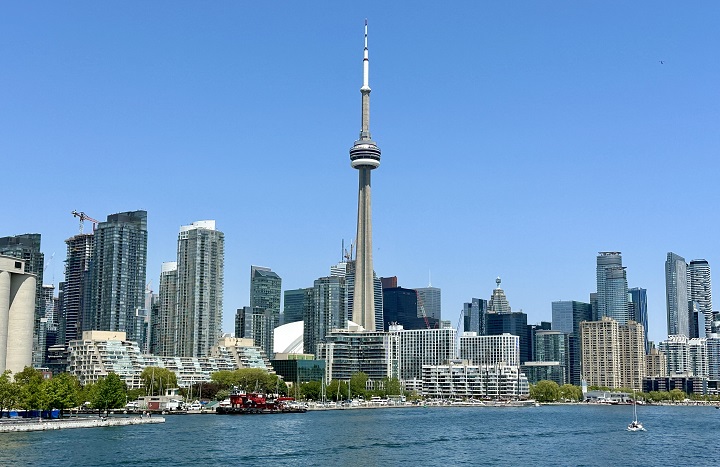Federal government rejects Toronto’s drug decriminalization request, Ford asks to pause safe supply programs

Posted May 17, 2024 10:24 am.
Last Updated May 17, 2024 6:38 pm.
The federal government has refused Toronto’s request to decriminalize personal possession of controlled drugs and substances.
In a statement issued late Friday, the Minister of Mental Health and Addictions Ya’ara Saks said Toronto Public Health’s request does not adequately protect public health and maintain public safety.
One of her concerns is a lack of support from the provincial government, which has vehemently opposed the idea.
The proposal called for decriminalization to be paired with a host of more direct public health responses to the overdose crisis.
The city sent its proposal to Health Canada in January 2022 and, after more consultations, updated its submission in March 2023.
The announcement comes after Ontario Premier Doug Ford wrote a letter to the prime minister calling for a review of the Health Canada-approved sites across the country.
The requests come after the provincial health minister and solicitor general wrote to Toronto Public Health’s top doctor, telling her to drop the city’s application to decriminalize illegal drug possession for personal use.
Dr. Eileen de Villa defended the application and the chair of the city’s board of health refused to drop it. They said they are trying to save lives and noted that safe supply is one tool that can help.
Prime Minister Justin Trudeau has said Toronto would need provincial support for its decriminalization bid. Ford said he’d like safe supply sites to also require provincial buy-in.
“I’m now asking that you also extend the requirement for provincial support to ‘safe supply’ sites, which are approved solely and unilaterally by Health Canada,” the premier wrote.
“Due to Health Canada’s siloed approval process, the province is completely in the dark about where these federally approved sites are operating and the quantity of controlled and illegal substances they dispense. This is frankly unacceptable.”
Health Canada lists 16 safe supply projects approved in Ontario – all but one, in Thunder Bay, Ont., are in southern Ontario.
“Safer supply services can help prevent overdoses, save lives, and connect people who use drugs to other health and social services,” Health Canada says on its website.
Toronto Mayor Olivia Chow has written her own letter, calling on the Premier and the Prime Minister to join with the city to pilot what she calls 24/7 treatment programs and crisis centres.
“I welcome the premier and the prime minister’s focus on the tragic deaths of more than 500 people every year in Toronto,” said Chow during an unrelated announcement Friday morning. “24/7 crisis center to relieve the pressure on the emergency departments in hospital and deal with each person in individual ways and then expanding access to evidence-based treatment for substance abuse to make sure that people who want to recover and receive the care can receive it. Right now, a recent survey tells us that a third of the people that are homeless in our shelters want drug treatement programs – they want to turn their lives around but they cannot access it because there’s no space.”
Trudeau said Friday his government is taking a public health and safety approach to the opioid crisis “as opposed to unnecessarily criminalizing and further marginalizing people.”
“But no order of government can do this alone,” he said. “That’s why we’re focused on working with people on the front lines, whether it’s at the provincial health systems or at the cities, to keep people safe.”
He didn’t say whether the federal government would pause safe supply approvals or conduct a review of the current sites.
Health professionals and advocates say pharmaceutical-grade opioids, in the form of hydromorphone pills, are a safer alternative to street drugs.
Opioids have torn through the country over the past decade leaving thousands dead every year. Before that, prescription pills such as oxycodone and Percocets were widely used.
That changed about 10 years ago when synthetic fentanyl, largely created in clandestine labs in China, began hitting the west coast. The opioid crisis slowly spread east. Police in Ontario have noted a rise in homegrown fentanyl labs in recent years.
Ontario’s chief coroner has found fentanyl in the vast majority of opioid overdose deaths, often found in a dangerous cocktail with benzodiazepines and, lately, with xylazine, a tranquillizer used by veterinarians on animals.
Ford, in his letter, pointed to British Columbia’s experience with decriminalization as a reason for opposing safe supply.
The B.C. government recently received federal approval to recriminalize public drug possession, a major climb down for the first-of-its-kind decimalization pilot in Canada.
“An earlier review conducted by their provincial health officer also indicated that the diversion of controlled substances obtained at these facilities was a common occurrence, including to trade for more lethal and harmful drugs like fentanyl,” Ford wrote.
“It also indicated that diversion is contributing to higher youth opioid use rates and has led to individuals in successful treatment services relapsing due to easy access.”
The province’s position on safe supply sites is at odds with Ontario’s Chief Medical Officer of Health, Dr. Kieran Moore, who has called for expansion of safe supply as one tool to deal with the opioid crisis.
The Ford government is opposed to Moore’s position.








